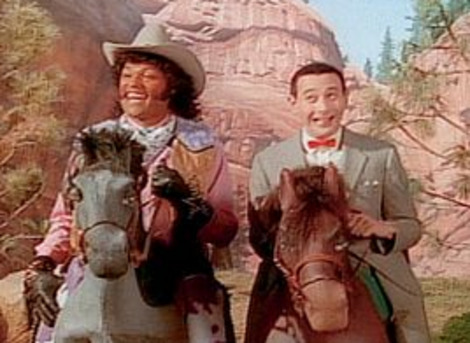« Reply #297 on: October 27, 2017, 08:00:47 pm »
People sunbathe; they impetuously jump up and go swimming, have unhurried meals al fresco, cycle into town to drink in bars, or play volleyball. At any one time, nothing is happening, and everything is happening. Elio and Oliver will catch each other’s eye in their adjoining bedrooms or downstairs in the hall; they will casually notice each other changing into swimming costumes. Each of these intensely realised, superbly controlled and weighted moments is as gripping as a thriller.https://www.theguardian.com/film/2017/oct/26/call-me-by-your-name-review-luca-guadagnino-armie-hammer Call Me by Your Namegorgeous gay love story seduces and overwhelmsSet during an endless Italian summer, Luca Guadagnino's ravishing drama starring
Call Me by Your Namegorgeous gay love story seduces and overwhelmsSet during an endless Italian summer, Luca Guadagnino's ravishing drama starring
Armie Hammer and Timothée Chalamet is imbued with a sophisticated sensuality★★★★★by Peter Bradshaw
@PeterBradshaw1
Thursday 26 October 2017 10.30 EDT  Hellenic sensuality is resurrected in concert with the not-so-secret sexual tumult emerging all about: Timothée Chalamet and
Hellenic sensuality is resurrected in concert with the not-so-secret sexual tumult emerging all about: Timothée Chalamet and
Armie Hammer in Call Me by Your NameThe debt to pleasure is deferred in exquisite style for this ravishingly beautiful movie set in Northern Italy in the early 80s: a coming-of-age love story between a precocious teenage boy and a slightly older man. Their summer romance is saturated with poetic languor and a deeply sophisticated sensuality.
The film is directed by Luca Guadagnino (who made I Am Love and A Bigger Splash) and adapted from the novel by André Aciman by James Ivory, who had originally been slated to co-direct and has a producer credit. Ivory’s presence inevitably calls to mind his film version of EM Forster’s Maurice, to which this is frankly superior. For me, it brought back Alan Hollinghurst novels such as The Folding Star and The Spell. Call Me By Your Name is an erotic pastoral that culminates in a quite amazing speech by Michael Stuhlbarg, playing the boy’s father. It’s a compelling dramatic gesture of wisdom, understanding and what I can only call moral goodness.
Stuhlbarg plays Perlman, a middle-aged American professor of classical antiquity living with his stylish wife Annella (Amira Cesar), in a handsome Italian house with their son, Elio – a remarkable performance from Timothée Chalamet – who is a very talented musician, spending his time transcribing Schoenberg and composing piano variations on JS Bach. Theirs is a cultured household, in which everyone is proficient in English, French, Italian and, for Annella, German. The family is also Jewish. Elio calls them “Jews of discretion”, a sense of otherness that is to serve as a metaphor for concealed sexuality.
Elio slopes and mopes about the huge house as the long hot summer commences, grumpy and moody, not knowing what to do with himself or his directionless sexuality, shooing away flies, frowning over paperbacks, dressed mostly in nothing more than shorts, all shoulder blades and hairless calves. Every year, his dad invites a favoured grad student to spend the summer with the family to help him with research. This year it is the impossibly handsome and statuesque Oliver, played by Armie Hammer, who never wears a pair of long trousers in the entire film. He establishes his academic credentials early on by presuming to correct Perlman’s derivation of the word “apricot”. Both Elio and Oliver are to have romantic associations with local young women, but it is more than clear where this is heading. And when the main event arrives, Guadagnino’s camera wanders tactfully away from their bed, gazing thoughtfully out of the window at the hot summer night.
What is perhaps so incredible is the concept of leisure, a cousin to pleasure, pure gorgeous indolence and sexiness for six whole weeks. No one appears to have very much to do in the way of dreary work, despite the references to typing up pages and cataloguing slides. People sunbathe; they impetuously jump up and go swimming, have unhurried meals al fresco, cycle into town to drink in bars, or play volleyball. The main work-related activity is when Perlman and Oliver go to inspect a sensational discovery: parts of a classical statue recovered from a lake. Hellenic sensuality is resurrected in concert with the not-so-secret sexual tumult emerging all about.
At any one time, nothing is happening, and everything is happening. Elio and Oliver will catch each other’s eye in their adjoining bedrooms or downstairs in the hall; they will casually notice each other changing into swimming costumes. Each of these intensely realised, superbly controlled and weighted moments is as gripping as a thriller. Hammer’s Oliver is worldlier than Elio, but not a roué or a cynic; in an odd way, Elio is more cosmopolitan than Oliver. The visiting American looks like a mix of Tom Ripley and Dickie Greenleaf.
Chalamet’s performance as Elio is outstanding, especially in an unbearably sad sequence, when he has to ring his mum from a payphone and ask to be driven home. (In that scene, Guadagnino contrives to show an old lady fanning herself in the right-hand side of the frame. Was she an actor? A non-professional who just happened to be there? Either way, there is a superb rightness to it.) And then there is Stuhlbarg’s speech advising against the impulse to cauterise or forget pain: “We rip out so much of ourselves to be cured of things faster than we should that we go bankrupt by the age of 30.” There is such tenderness to this film. I was overwhelmed by it.And 9 months earlier--
Call Me by Your Name is a masterful work because of the specificity of its details. This is not a love story that “just happens to be gay”. The level of trust and strength these characters share brings a richness that is not necessarily known to a universal audience. But the craft on display from all involved is an example, yet again, of how movies can create empathy in an almost spiritual way. This is a major entry in the canon of queer cinema.
https://www.theguardian.com/film/2017/jan/23/call-me-by-your-name-review-italian-romance

Sundance 2017
Call Me by Your Name
Sundance 2017 Review
Luca Guadagnino's masterful coming-of-age tale of an Italian fling between visiting academic
Armie Hammer and professor’s son Timothée Chalamet is a major addition to the queer canon
by Jordan Hoffman
@jhoffman
Monday 23 January 2017 06.27 EST

‘Touching and triumphant’ ... Michael Stuhlbarg, Timothée Chalamet and Armie Hammer in Call Me by Your Name
Let’s bite right into the sweetest part of the fruit while it’s ripe. There’s a scene near the end of Luca Guadagnino's adaptation of André Aciman's novel Call Me by Your Name between Michael Stuhlbarg and Timothée Chalamet that is, I feel confident in saying, one of the best exchanges between father and son in the history of cinema. We’ll all be quoting from it for the rest of our lives.
For many it will be a moment of wish fulfilment, and that may go doubly for queer people whose parents tragically reject them for their nature. The scene is touching and triumphant, but it wouldn’t work on an island. It comes after a build-up, an unhurried coming-of-age tale set in 1980s Italy reminiscent of the best of Eric Rohmer, Bernardo Bertolucci and André Téchiné, in which Elio (Chalamet) falls in love with Oliver (Armie Hammer) and needs to decide how he’ll direct the rest of his life.
Oliver is the latest in a string of annual research assistants joining Professor Perlman (Stuhlbarg) at his family’s fabulous summer villa. Elio’s father is an archaeologist/art historian, and his French mother (Amira Casar) recites German poetry, translating it on the fly as the two men in her life cuddle up with her on the couch. For fun Elio transcribes classical piano scores, which he can also transpose to guitar. The Perlman family is one that can slip a reference to Heidegger into conversation and no one will bat an eye.
It’s a world where the broad-shouldered, blond Oliver fits in nicely. He savagely owns Professor Perlman with his mad etymology skills, breaking down the word “apricot” to its Latin, Greek and Arabic roots. His half-unbuttoned shirt reveals a Star of David necklace, which catches 17-year-old Elio by surprise. (Elio later explains that his mother considers the Perlmans “Jews [of] discretion” in the sleepy northern Italian vacation village.) At first Elio is annoyed by Oliver, but quickly becomes infatuated. How Oliver feels about Elio is more of a mystery, but as the days and nights continue (so many meals outside! And dancing to the Psychedelic Furs!) the invitations to “go for a swim” eventually turn intimate.
Of the numerous fascinating, nuanced and realistic facets to their relationship, it’s hard at times to determine who is the driving force. Elio seems the aggressor, and unashamed about his feelings. (Though why is he so determined that his family’s gay friends catch him smooching a vacationing French girl?) Oliver seems so lithe, but are his initial rejections meant to protect Elio, or is he himself panicked about doing “something bad”? Luckily, this is a movie wise enough for its characters to be a little contradictory.
Luca Guadagnino’s last two films, A Bigger Splash and I Am Love, were both highly stylised, with dazzling extreme closeups, high-speed editing and brash musical selections. To put it in blunt terms, he reels it in this time. Scenes play out at a pace more befitting a summer in the Italian sun, and while there’s no shortage of well-placed props (a Robert Mapplethorpe print here, a Talking Heads T-shirt there) the natural settings and ancient cities are enough to keep the frame looking marvellous. A lesser film-maker (and co-writers including Walter Fasano and the great 88-year-old James Ivory) would probably cut the scene where bike-riding Elio and Oliver ask for a glass of water from an old woman peeling beans outside an old house. But these are the true-to-life grace notes that make this film so touching.
Call Me by Your Name is a masterful work because of the specificity of its details. This is not a love story that “just happens to be gay”. The level of trust and strength these characters share brings a richness that is not necessarily known to a universal audience. But the craft on display from all involved is an example, yet again, of how movies can create empathy in an almost spiritual way. This is a major entry in the canon of queer cinema.
« Last Edit: October 27, 2017, 10:58:39 pm by Aloysius J. Gleek »

Logged
"Tu doives entendre je t'aime."
(and you know who I am...)

Cowboy Curtis (Laurence Fishburne)
and Pee-wee in the 1990 episode
"Camping Out"